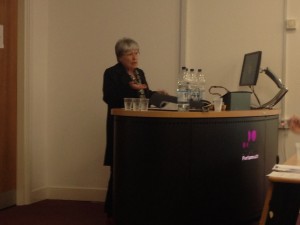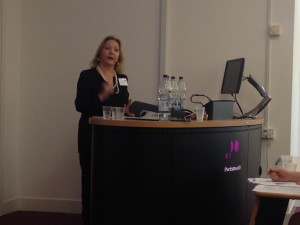This post is the product of a conversation between Dr Ed Naylor and Dr Natalya Vince about the recent ‘Progress, Change and Development’ conference, which took place on 4-6 June 2015 at the University of Portsmouth.
Among the many stimulating panels of the conference, the final session of Saturday morning particularly stood out for us. Entitled ‘National liberation and nation-building: Algeria in the 1960s’, the panel featured two women who were simultaneously first-hand witnesses to Algeria’s early years of independence and intellectuals offering reflections on these experiences. Cathérine Levy, whose personal archives are now at the BDIC in Nanterre, recalled teaching at a school in the Algiers Casbah during the Ben Bella presidency (1962-1965) where she and her colleagues found themselves spontaneously reinventing a ‘postcolonial’ syllabus. Fascinating details also emerged on agricultural ‘autogestion’ (self-management) initiatives and localised micro-currencies, as well as tensions surrounding the women’s movement. Natalya Vince, chairing the session, picked up on one aspect of Lévy’s testimony which chimed with her own experience researching her monograph Our Fighting Sisters (2015): during these early years of the Republic, senior posts throughout government were held by individuals of remarkable youth who retained close ties to comrades from the independence struggle. This proximity within an urban educated milieu, where a teacher might solicit a minister on an issue, is a recurring feature of narratives of the first years of independence.
With Beida Chikhi the session moved forward to the Boumedienne era (1965-1978), and her elegant talk communicated a persistent sense of possibilities and excitement amidst nation-building. In a particularly suggestive phrase, she described the social zeitgeist of the 1960s as ‘l’apprentissage de l’indépendance’. Sharing her personal recollections, Chikhi also spoke of an ‘effervescence cosmopolite’ and stressed the intellectual and artistic mobility of the period. With the Algerian Republic at the height of its prestige in the non-aligned movement, its capital was a natural centre for these exchanges: from the Pan-African festival of 1969, to members of the Black Panther movement and the film-maker William Klein. At once knowingly nostalgic and full of thought-provoking details, her portrait of this decade was clearly framed as a counterpoint to the disillusionment of the Chadli years that followed. A point that emerged from the discussion was that piecing together the complex social history of early post-revolutionary, semi-authoritarian regimes is difficult not least because it is often overdetermined by what preceded and followed. Comparisons with Tito’s Yugoslavia or even Egypt under Nasser suggest themselves as a way of thinking through these questions.
While the two speakers had rather different perspectives on the trajectory of post-revolutionary Algeria, their talks complemented each other superbly. The audience was left with a sense of both the enormous challenges and exciting possibilities confronting historians of this post-independence decade.


